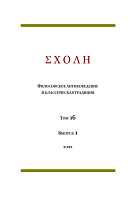ПРИНЦИП «ARS IMITATUR NATURAM» В ГЕНЕЗИСЕ ФИЛОСОФСКО-ОБРАЗОВАТЕЛЬНЫХ КОНЦЕПЦИЙ ЯНА АМОСА КОМЕНСКОГО И ГРИГОРИЯ СКОВОРОДЫ
THE PRINCIPLE OF "ARS IMITATUR NATURAM" IN THE GENESIS OF PHILOSOPHICAL AND EDUCATIONAL CONCEPTIONS OF JAN AMOS KOMENSKY AND GRIGORY SKOVORODA
Author(s): Anna S. StepanovaSubject(s): Philosophy, Education, Early Modern Philosophy, 17th Century, 18th Century, Pedagogy
Published by: Новосибирский государственный университет
Keywords: Aristoteles; Filipp Melanhton; Skovoroda; Tomaso Campanella; pansophia; principle “ars imitatur naturam”;
Summary/Abstract: The article is devoted to the study of the role and modification of the Aristotelian principle of ars imitatur naturam in the formation of the concept of the Czech thinker, teacher, and theologian Jan Amos Comenius. The variety of approaches of Protestant thinkers to Aristotle's principle, born in the discussion, allowed Comenius to address it critically, perceiving it comprehensively and extending the concept of art to the sphere of education. Campanella's ideas moved Comenius to remove the veneer of indeterminacy from nature, promoting an understanding of it as a friendly and creative beginning. The author notes the peculiarity of Comenius' interpretation of this principle, giving it the meaning of universal nature-humanitarian mechanism which suited his concept of pan-sophia to the fullest extent. Comenius and G. Skovoroda, who developed the concepts of kinship and wisdom in the light of the ideas of enlightenment, thus laying the foundations of humanistic philosophy and pedagogy of the New Age and Enlightenment era, make an analogy between the interpretations of the Aristotelian thesis.
Journal: ΣΧΟΛΗ. Философское антиковедение и классическая традиция
- Issue Year: XVI/2022
- Issue No: 1
- Page Range: 172-190
- Page Count: 19
- Language: Russian

